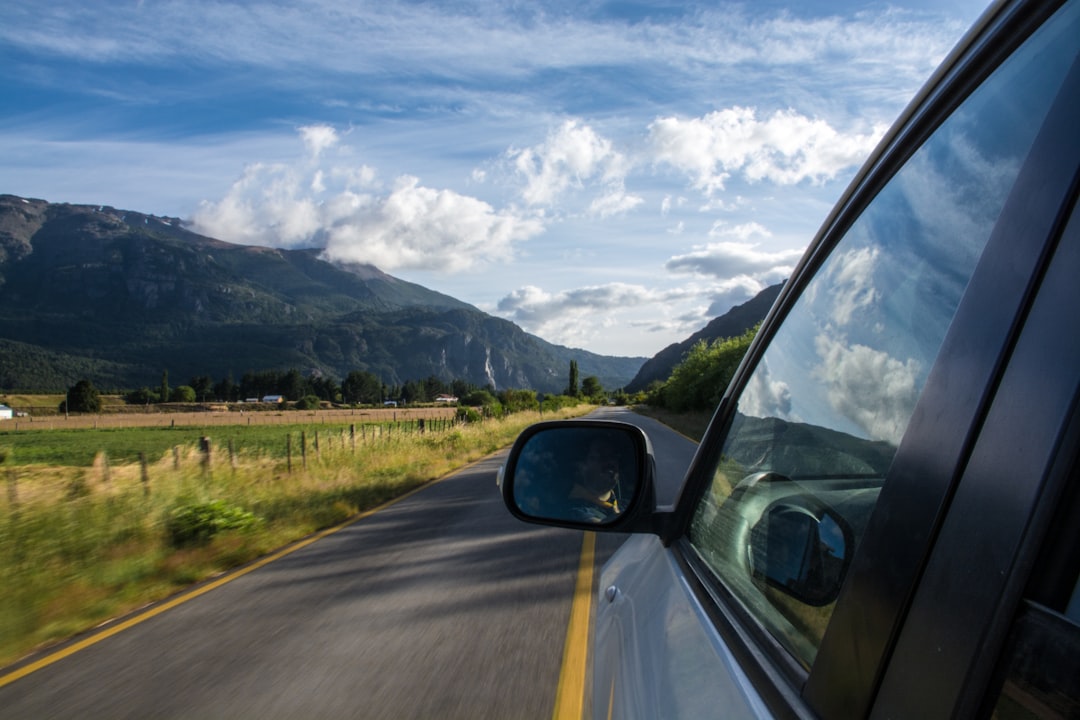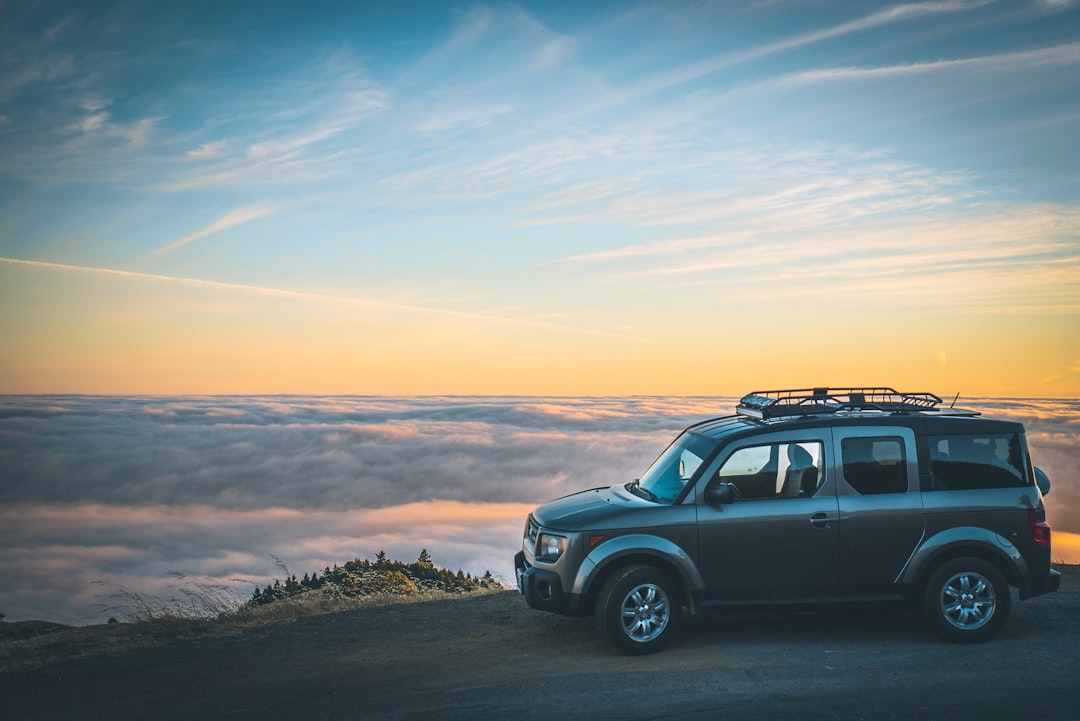Road Trip Ready: Tips to Ensure Your Vehicle is Fit for Your Next Adventure
Road Trip Ready: Tips to Ensure Your Vehicle is Fit for Your Next Adventure - Check Your Tires

Having properly inflated tires with adequate tread depth is one of the most important things you can do to ensure a safe road trip. Driving long distances with underinflated or worn out tires significantly increases the chances of a blowout or other tire failure, which could have disastrous consequences.
Before any long distance drive, use a quality tire pressure gauge to check the air pressure in each tire, including the spare. Compare the measured pressure to the vehicle manufacturer's recommended inflation pressure listed on the sticker inside the driver's door jamb or in the owner's manual. If the pressure is low, inflate to the proper level.
While you're inspecting pressures, also closely examine tire treads. Insert a penny into several tread grooves across the tire, with Lincoln's head pointing inward. If you can see the top of Lincoln's head, the tread depth is less than 2/32 of an inch and it's time to replace the tire before your trip. As a rule of thumb, tires should be replaced once they reach 6/32 of an inch of remaining tread.
Don't just check the tires you can see either. Make sure to check the inner sidewalls of the tires, including those on dual rear wheels if you're driving an RV or trailer. Look closely for any cracks, cuts, bulges or other damage that could cause a blowout. If you spot any issues, have a qualified tire shop inspect and replace any tires that are damaged or excessively worn. New tires may be warranted if you'll be driving long miles with heavy loads.
While examining tires, verify they are all the same size and speed rating recommended by your vehicle or trailer manufacturer. Mismatched tires, too-small tires and/or tires with too low of a speed rating are unsafe and illegal in some states. If you discover any mismatches, replace them in complete sets of four or six to ensure proper handling and safety.
Proper tire inflation and condition are especially critical when towing trailers and RVs, since the extra weight intensifies wear and the risk of failure. Do a walk-around inspection before each day's driving, checking pressures and looking for signs of damage. Consider bringing along a portable air compressor so you can refill as needed.
What else is in this post?
- Road Trip Ready: Tips to Ensure Your Vehicle is Fit for Your Next Adventure - Check Your Tires
- Road Trip Ready: Tips to Ensure Your Vehicle is Fit for Your Next Adventure - Pack an Emergency Kit
- Road Trip Ready: Tips to Ensure Your Vehicle is Fit for Your Next Adventure - Get Your Vehicle Service
- Road Trip Ready: Tips to Ensure Your Vehicle is Fit for Your Next Adventure - Clean Out the Clutter
- Road Trip Ready: Tips to Ensure Your Vehicle is Fit for Your Next Adventure - Update Your Maps
- Road Trip Ready: Tips to Ensure Your Vehicle is Fit for Your Next Adventure - Check Your Fluids
- Road Trip Ready: Tips to Ensure Your Vehicle is Fit for Your Next Adventure - Install Phone Mounts
Road Trip Ready: Tips to Ensure Your Vehicle is Fit for Your Next Adventure - Pack an Emergency Kit
A well-stocked emergency kit can be a road tripper's best friend in the event of a breakdown or accident far from help. Yet many travelers hit the road without one, often realizing their mistake only when something goes wrong. Equipping your vehicle properly before departure provides essential tools and supplies to get you out of a jam, whether you have a flat tire, dead battery or worse.
According to automotive expert Ron Ananian, "A good emergency kit tailored to your specific needs can literally be a lifesaver if you break down or get stranded." Ananian, who writes for popular automotive sites like The Car Connection, owns several kits for his own vehicles. "I make sure each car or RV has a kit with basic tools, first aid supplies, and enough food and water for several days if needed. It doesn't take up much space but provides real peace of mind when traveling to remote areas."
Montana native Katy Whitfield knows firsthand the value of emergency kits. During a cross-country road trip in college, disaster struck when her car's radiator failed in the middle of the Nevada desert. "We had some snacks and a little water, but no real supplies or tools to fix the car. We were totally stranded and ended up waiting almost a day for help to arrive," she recalls. Ever since, Whitfield has kept a well-stocked kit in her trunk. "Now, when trouble strikes, I'm prepared whether it's a quick roadside repair or an overnight wait for a tow truck."
So what should you include in your emergency kit? Auto clubs like AAA recommend starting with a basic tool set including screwdrivers, pliers, wrenches, jumper cables, a tire jack, and lug wrench. Flares, cones, or warning triangles are also essential for alerting other motorists if you break down. Beyond that, a flashlight, batteries, duct tape, work gloves, road maps, sunscreen, and other necessities tailored to your trip and destination make sense. Don't forget the all-important cell phone charger!
Food, water, and first aid supplies also come in handy during unexpected delays. High protein snacks like beef jerky or nutrition bars provide energy while you wait for help. Bottled water prevents dangerous dehydration in hot climates. A well-stocked first aid kit containing bandages, antiseptic, aspirin, and other medical essentials enables you to treat minor injuries. Space blankets, matches, and other fire starting tools could be vital if stranded overnight far from shelter.
Road Trip Ready: Tips to Ensure Your Vehicle is Fit for Your Next Adventure - Get Your Vehicle Service
Getting your vehicle professionally serviced before embarking on a road trip is one of the smartest things you can do to avoid breakdowns and travel mishaps. Though it may seem like an unnecessary expense, the cost is trivial compared to the headaches and havoc of a major mechanical failure miles from home. Preventive maintenance and pre-trip inspections by qualified mechanics can nip most potential problems in the bud. Yet many travelers try to save a few bucks by skipping this vital step. Don't let false economies put your road trip - and safety - at risk.
James Cooper of Arizona found out the hard way after his family set out on a long-awaited Grand Canyon vacation, only to have their minivan's transmission fail before they even left the state. "We limped back home and lost nearly a week of vacation time waiting for repairs," Cooper laments. "A $150 service check before we left could have saved the whole trip. Now I always get a mechanic's thumbs up before road trips."
Wise travelers make sure all fluids, belts, hoses, tires, brakes and other critical systems are in top shape prior to departure. This prevents most mechanical issues that commonly strand motorists out in the middle of nowhere. Oil and filter changes, transmission services, coolant flushes, new wiper blades and similar maintenance procedures are advisable before driving long distances - especially if time has lapsed since your last service.
Safety checks and computer scans by professional mechanics can also detect worn parts and potential problems not apparent to untrained eyes. "We routinely find major issues like bad wheel bearings, leaky radiators, and faulty oxygen sensors on pre-trip inspections," says veteran auto technician Mark Flores. "Repairing these before travel prevents lots of headaches down the road."
For peace of mind, some travelers splurge on specialized "trip check" services at dealerships and repair shops before big journeys. These comprehensive, bumper-to-bumper inspections cover all critical systems. High-tech computer scans analyze engine performance down to the smallest sensor. Such meticulous examinations can catch flaws and looming failures that even skilled mechanics might miss on standard inspections.
If you're towing a trailer or RV, it's even more critical to get your vehicle road-ready beforehand. The heavy loads of travel trailers accelerate wear on tires, brakes and drivetrains. A tow vehicle on its last legs is an accident waiting to happen. Don't roll the dice with your family's lives by skimping on proper maintenance.
Road Trip Ready: Tips to Ensure Your Vehicle is Fit for Your Next Adventure - Clean Out the Clutter

Before heading out on the open road, take time to thoroughly clean out your vehicle inside and out. A cluttered, dirty interior is an absolute joykill during long days spent driving. Plus, all that junk piles up fast when you're living on the go. So do yourself a favor and give your ride a deep cleanse before departure. You'll be glad you did down the road.
"I'm a total neat freak, so I always detail my car before road trips," says Amanda Winters of Los Angeles. "It keeps things pleasant when we're stuck in the car for hours." She advises completely clearing out trash, dust and other debris. "I like to start fresh with empty compartments and a spotless interior. It makes the miles go by easier."
For those less fastidious, even a basic interior cleanout makes travel more enjoyable. Simply tossing old receipts,empty bottles and other litter vastly improves your on-the-go environment. Samantha James swears by her pre-trip ritual of removing everything from her vehicle floor. "Just taking out the trash and giving the carpets a good vacuuming keeps things nicer," she says. "It also helps me find stuff that's fallen under the seats over time."
Extremely cluttered vehicles warrant more aggressive purging before hitting the road. "I empty out the whole car and reorganize it from scratch," says road warrior Vanessa Lee. "No more mystery items rolling around the trunk or forgotten paperwork overflowing the glovebox." She recommends trashing or removing anything you don't really need,then compartmentalizing essentials into storage bins and organizers. This keeps important items tidy and accessible.
For folks towing campers and RVs, interior cleanouts are equally beneficial. "We do a total reset of the camper before big trips," says Bonnie Myers, a full-time RVing grandmother of four based in Florida. "Clearing out the clutter and giving everything a thorough scrubbing makes living on the road much more pleasant." She suggests storing off-season clothes and gear to open up living space. A fresh coat of paint also works wonders on dingy camper interiors.
Don't forget the vehicle's exterior either. Road grime builds up quickly when traveling long distances. "We wash our truck and camper before each trip," says Myers. "It improves the whole travel experience when your rig is squeaky clean inside and out." Waxing also protects paint from abrasive dust and dirt encountered en route. New floor mats help keep the interior tidy across muddy and dusty terrain.
Road Trip Ready: Tips to Ensure Your Vehicle is Fit for Your Next Adventure - Update Your Maps

Outdated maps spell disaster when road tripping into unfamiliar terrain. Nothing frustrates travelers more than getting lost due to inaccurate directions and maps. So make sure your navigational aids are up-to-date before any long-distance journey.
Paper maps deteriorate quickly as roads and landmarks change. Map apps and GPS systems also need periodic refreshing to stay current. "I learned the hard way to always get the latest maps after GPS led me astray on a mountain road that didn’t exist,” says Marie Wilson of Utah. “We got totally lost in the middle of nowhere thanks to an outdated system.” She now updates her built-in navigation annually and also brings the newest printed maps on road trips.
State highway departments revise official maps yearly to reflect the latest adjustments. Big fold-out atlases and road maps available at rest stops and gas stations are likewise updated frequently, so grab the newest edition before your trip. If opting for GPS, be sure map data is fully up to date through the latest downloads and software upgrades. Don’t rely on maps that are more than 12 months old.
Map apps like Google Maps require connectivity to stay accurately updated. So ensure your phone’s data plan provides coverage in the areas traveled. Downloading offline maps of key regions before the trip provides backup navigation if you lose service. Apps like Maps.Me let you download detailed offline maps worldwide for free.
When planning remote travel far from cellular signals, standalone GPS units with built-in maps work well. “I always carry a Garmin with Navionics maps as backup on my outdoor adventures,” says Noah Jones, an avid outdoorsman. “It’s saved me from getting lost hiking and jeeping countless times when my phone had no service.”
For additional backup, capturing screenshots of online maps and directions in advance is wise. “I take pictures of the map route and landmarks on my phone before heading into areas with sketchy coverage,” explains Sara Brown, a frequent long-distance driver. “That way I have something to reference if both data and GPS fail in the middle of nowhere. It's old school but works!”
Bear in mind paper and digital maps have limitations, especially in less developed regions. Primitive roads and informal trail systems rarely appear on even the best maps. When journeying into very remote areas, hiring experienced local guides is advisable. Indigenous peoples possess generations of undocumented geographical knowledge that no map can provide.
Road Trip Ready: Tips to Ensure Your Vehicle is Fit for Your Next Adventure - Check Your Fluids

Regularly checking and topping off vital automotive fluids before an extended road trip helps prevent breakdowns and delays. However, many travelers neglect this basic maintenance, often leading to costly mechanical headaches down the road.
"We learned the hard way after our minivan's engine overheated in the California desert due to a coolant leak we never checked before leaving home," recalls road tripper Heather Wilson. "Always verify full fluid levels yourself or have a mechanic do it right before any long-distance drive."
Engine Oil - Low oil levels can cause severe internal engine damage and even complete breakdowns. Check the dipstick and top off as needed with the manufacturer's recommended oil type and viscosity.
Brake Fluid - Worn brake pads will trigger dashboard warnings, but inadequate fluid is not always obvious. Check reservoirs and add DOT 3 or DOT 4 brake fluid as necessary. Moisture contamination can cause dangerous brake failure.
Fuel System Additives - Products like Techron and Red Line SI-1 help clean fuel lines, injectors and valves for smoother operation. Add before travel, especially in older, higher mileage vehicles prone to deposits. Beware of snake oil additive claims, however.
While checking under the hood, also inspect belts and hoses for cracks, fraying and leaks. Damaged or loose belts can disable accessories like power steering and alternators. Brittle, bulging or weeping hoses portend overheating disasters. Replace any questionable components before your trip.
Road warrior James Cooper advises, "Taking time upfront to check all fluids and fix any leaks provides great insurance against breakdowns down the highway. I've had a radiator hose burst miles from civilization - it's brutal. So I now make absolutely sure to verify full fluid levels before any long-distance driving."
Road Trip Ready: Tips to Ensure Your Vehicle is Fit for Your Next Adventure - Install Phone Mounts
Hitting the open road with your phone rattling around the car is an accident waiting to happen. Fumbling for your device while driving ramps up the risk of wrecks, tickets and road rage when you take your eyes off the road. Luckily, installing a sturdy phone mount can keep your phone secure, visible and accessible without dangerous diversions.
"Mounting my phone so it's always in sight makes road trips so much less stressful," says frequent driver Allison Ward. "I can quickly glance at the screen for directions or music without taking my eyes off the road for long." She relies on a dashboard attachment that situates her phone front and center atop the console.
Other motorists opt for mounts placed higher on the windshield for optimal visibility when using map apps. "I need my phone within my line of sight for navigation," explains cross-country trucker Greg Wilson. "A mount right on the glass keeps it visible without blocking my view." Suction cups, clips and adhesives allow windshield positioning at eye level.
Those who prefer keeping phones low and out of the way can mount them on air vents. "I clip my phone to the vent by my knee which lets me sneak quick peeks without looking away from traffic," says Paul Jensen, a Los Angeles rideshare driver. The clips also permit adjusting airflow to prevent overheating phones.
Regardless of positioning, stability is key for safe phone use while driving. "I only use mounts with sturdy grips or clamps to hold my phone firmly in place," advises frequent motorist Amanda Clark. "The last thing you want is your phone falling onto the floor at 70 mph." Non-slip pads or vice-like spring clamps keep devices locked down over bumpy terrain.
Ease of use is another important feature when choosing mounts. "I need to be able to grab my phone with one hand for quick snapshots from awesome road views," says photographer and RV owner Tom Miller. Rotating, tilting and telescoping mounts allow access without excessive distraction. Charging abilities are another plus for extended trips.
Professional driver Max Rogers relies on a magnetic dashboard mount for efficiency. "I just place my phone on the magnet mount while driving then pop it off when stopped," he explains. The powerful magnets hold phones securely despite vibrations and impacts.
